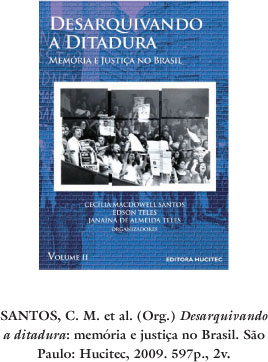
For many years Brazil has shied away from the painful task of confronting its past. Now, with former urban guerrilla Dilma Rousseff the country’s president, the process is tentatively moving forward. The most important step taken so far has been the decision to set up a Truth Commission.
One of the obstacles has been the lack of well-researched, detailed analysis of how the dictatorship operated. A new book, Desarquivando a ditadura: memória e justiça no Brasil, will help to fill this lacuna. Co-edited by the sociologist Cecília MacDowell Santos, the philosophy lecturer Edson Teles and the historian Janaína de Almeida Teles, this book brings together people from many different disciplines – historians, philosophers, literary critics, journalists and lawyers – to help build political memory and to look at the numerous way human rights were systematically flouted during the years of the dictatorship.
This two-volume study looks at events that profoundly marked the lives of many of those who lived through this period but that have never been analysed in a detailed way. In an article entitled “Memória e cidadania: as mortes de Vladimir Herzog, Manuel Fiel Filho e José Ferreira de Almeida”, the historian Mário Sérgio de Moraes looks at the how the media covered the deaths of three people, all killed by the military dictatorship — the journalist Vladimir Herzog, the industrial worker Manuel Fiel Filho and the political militant José Ferreira de Almeida. The author seeks to explain why Herzog’s death – and not the death of the other two -– provoked a mass protest movement. According to Moraes, this mobilisation led, in the midst of the dictatorship, to a heated discussion in society about citizenship in Brazil, thus paving the way for the consolidation of civil and political rights.
Other chapters analyse the resistance of the working class to the dictatorship, while in another Luis Negro looks at a much neglected topic – the role of women in this resistance. In particular, it shows how dozens of women activists infiltrated Brazil’s factories and helped to develop strong relations with women workers. Journalist Maurício Maia describes the ‘culture of secrecy’ in the criminal justice system, and examines relations between the press, the secret services and the courts in Sao Paulo from 1960 to 1975. This culture, he says, meant that political activists could ‘disappear’ without trace and constitutes what he sees as the most serious example of collusion between key pillars of Brazilian society and the intelligence services.
For more information, in Portuguese, go to EcoDebate

